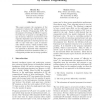Free Online Productivity Tools
i2Speak
i2Symbol
i2OCR
iTex2Img
iWeb2Print
iWeb2Shot
i2Type
iPdf2Split
iPdf2Merge
i2Bopomofo
i2Arabic
i2Style
i2Image
i2PDF
iLatex2Rtf
Sci2ools
137
Voted
GECCO
2000
Springer
2000
Springer
Controlling Effective Introns for Multi-Agent Learning by Genetic Programming
This paper presents the emergence of the cooperative behavior for multiple agents by means of Genetic Programming (GP). For the purpose of evolving the effective cooperative behavior, we propose a controlling strategy of introns, which are non-executed code segments dependent upon the situation. The traditional approach to removing introns was able to cope with only a part of syntactically defined introns, which excluded other frequent types of introns. The validness of our approach is discussed with comparative experiments with robot simulation tasks, i.e., a navigation problem and an escape problem.
Cooperative Behavior | Effective Cooperative Behavior | GECCO 2000 | Non-executed Code Segments | Optimization |
Related Content
| Added | 24 Aug 2010 |
| Updated | 24 Aug 2010 |
| Type | Conference |
| Year | 2000 |
| Where | GECCO |
| Authors | Hitoshi Iba, Makoto Terao |
Comments (0)

